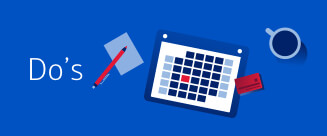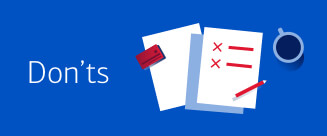How to graduate to an unsecured credit card
Tips to help you transition to an approved credit line
Read, 3 minutes
If you’re new to using credit—or your credit has taken a hit—it can be difficult to buy a home, lease a car or qualify for better interest rates. One common option to establish, strengthen or rebuild your credit is to open a secured credit card. Secured credit cards function much like traditional ones, but they require a cash deposit upfront to guarantee your credit line.
Using a secured credit card wisely can establish or improve your credit score over time. It can take anywhere from a few months to years of responsible use for your credit score to change.
To help you get there, here are 10 do’s and don’ts for using a secured credit card.

Make every payment on time and for more than the minimum whenever possible. Paying more than what’s required will go a long way toward building your credit score—if you can, consider paying off the full balance each month.
Set up email and text alerts for things like payment due dates or when your balance is nearing your credit limit. It’s also a good idea to enroll in auto pay so that you never miss a payment and avoid late fees.
Keep the total of your purchases lower than the total credit available to you—a good rule of thumb is to keep your balance under 30 percent of your available credit.
Check your FICO score and credit reports often. When you monitor your credit history, you can make sure your credit information is accurate and take action if your score has changed.
Stay on top of all forms of credit and bills. While your secured credit card can help you build a good credit history, it’s not the only factor affecting your score. Failure to make timely payments on other debts, like auto and student loans or rent and utilities payments, could impact your credit score.

Don’t skip a month's payment to any of your accounts—even if that means paying the minimum. By showing creditors that you can use credit responsibly, you will begin to build a positive credit history.
Don’t spend excessively—stay on top of your budget and only purchase things you can pay off right away. As your balance creeps up, it can become difficult to make monthly payments and, as interest charges build up, to pay more than the minimum.
Similarly, don't exceed the limits on your credit card accounts. Exceeding your limits may make it harder to access credit in the future.
Don’t open too many accounts within a short period of time. Back-to-back hard inquiries by creditors could ding your credit score.
Don’t forget that filing for bankruptcy or getting your account turned over to a collection agency will close the account. Keep in mind that while the account will no longer be available to you, its details will remain on your credit report and will impact your credit score.
4 signs you’re ready to graduate to an unsecured credit card
You prove over time that you use credit responsibly. | |
Your credit score improves consistently for several months in a row. | |
Your limits are raised on your secured card by your financial institution without requiring additional deposits. | |
You’re notified by your secured card issuer that you qualify to graduate. |
When you graduate to an unsecured card, you will get back your security deposit. It’s a good idea to put that money toward savings or your rainy-day fund.














